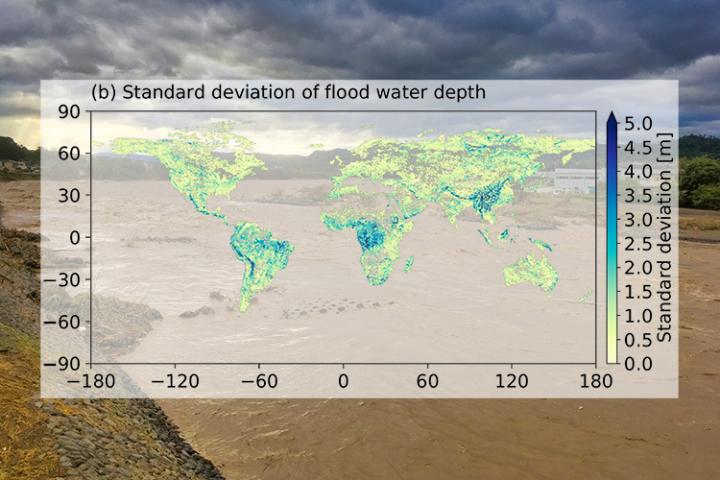
Credit: Institute of Industrial Science, the University of Tokyo
Tokyo, Japan – A research team from the Institute of Industrial Science, The University of Tokyo has conducted a detailed analysis of the uncertainties associated with flood risk modeling at the global scale. They found large uncertainties were mainly associated with runoff data. Flood magnitude is large in wet regions, but uncertainties in flood depth is larger in dry and mountainous regions affected by rare, extreme floods. The results of the study can be used to identify the key areas for improvement in hydrological modeling and improve future predictions of flood risk.
Assessment of the risk of rare and extreme floods is essential for disaster management and recovery planning at international, national, and regional levels. However, the accurate assessment of flood risk is limited by the number of observations possible, and relies on hydrological modeling which has limited performance. Theoretical flood hazard maps, which are relied on by governments, regional planners, insurance services, and other stakeholders, are an important part of understanding the potential extent of flood risk. However, they are subject to high levels of uncertainty, especially at the large scale.
“The main problem is that the creation of accurate flood hazard maps relies on excellent flood frequency analysis,” explains study co-author Dr. Wenchao Ma, “and the main limitation of that is its reliance on assumptions about the underlying distribution of flood events, which is hugely variable among different regions of the world. There is no single solution that can be applied everywhere.”
The research team found that uncertainties in runoff inputs contributed more than 80% of the total uncertainty. Overall uncertainties were highest in Africa, but exposure risk was greatest in Asia. “We found that land susceptible to rare floods – called 1-in-100-year floods – accounts for 9.1% of the global area, excluding Antarctica,” says study lead author Dr. Xudong Zhou. “In addition, the numbers show 13.4% of the population may be exposed to such a flood event, with a potential economic impact of up to 14.9 trillion US dollars to global GDP.”
More adjustments are needed to flood hazard maps to ensure their accuracy. Further data are needed to take into account the efforts made by flood defenses and dam regulations and to improve inputs for areas with large uncertainties, such as Africa. Such improvements would reduce these uncertainties and improve these resources for use under future climatic conditions.
###
The article, “The uncertainty of flood frequency analyses in hydrodynamic model simulations” was published in Natural Hazards and Earth System Sciences at DOI: 10.5194/nhess-21-1071-2021
About Institute of Industrial Science (IIS), the University of Tokyo
Institute of Industrial Science (IIS), the University of Tokyo is one of the largest university-attached research institutes in Japan.
More than 120 research laboratories, each headed by a faculty member, comprise IIS, with more than 1,000 members including approximately 300 staff and 700 students actively engaged in education and research. Our activities cover almost all the areas of engineering disciplines. Since its foundation in 1949, IIS has worked to bridge the huge gaps that exist between academic disciplines and realworld applications.
Media Contact
Dai Yamazaki
[email protected]
Original Source
https:/
Related Journal Article
http://dx.




